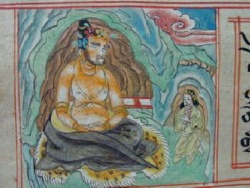Voice-hearers
voice-hearer
声聞 (Skt shravaka; Jpn shomon )
Also, voice-hearer disciples. Shakyamuni Buddha's disciples who heard his preaching and strove to attain enlightenment. Shravaka, or "one who hears the voice," in Shakyamuni's time referred to his disciples, both monks and laymen. Later Mahayana Buddhists applied the term to those Hinayana monks who "heard" the teachings of the [[four
noble truths]] and aimed at attaining the state of arhat, and eventually, the nirvana of no remainder. The nirvana of no remainder refers to a state in which both body and mind— the sources of suffering—are extinguished. Mahayana sutras criticize voice-hearers as seeking only their own enlightenment and exerting no effort to save others. As a result, many of
these sutras characterize them as being unable to attain Buddhahood. The Lotus Sutra, however, defines voice-hearers as those who "take the voice of the Buddha way and cause it to be heard by all." Voice-hearers and cause-awakened ones are called persons of the two vehicles. While most Mahayana sutras deny that such individuals can attain enlightenment, the
Lotus Sutra teaches that they can and predicts that they will. The realm of voice-hearers constitutes the seventh of the Ten Worlds and is sometimes referred to as the world of learning.
